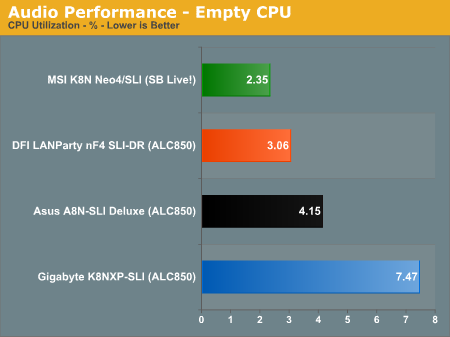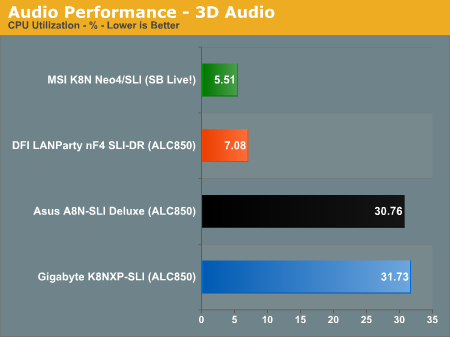nForce4 SLI Roundup: Painful and Rewarding
by Wesley Fink on February 28, 2005 7:00 AM EST- Posted in
- Motherboards
Audio Performance
Audio Performance is an area that we will be developing as we expand the new motherboard suite. We plan to provide Quality benchmarks and subjective listening to the more basic performance tests. For this SLI roundup, we limited audio testing to the Rightmark 3D Sound CPU utilization test. This benchmark measures the overhead or CPU utilization required by a codec or hardware audio chip.



We have to congratulate MSI on their choice of Creative SoundBlaster Live! 24-bit for audio. Similarly, DFI deserves praise for their excellent design work on the Karajan module, which reduces overhead to such low levels compared to competing implementations of the same Realtek 850 codec.










108 Comments
View All Comments
Reflex - Tuesday, March 1, 2005 - link
#83: Not sure what to say to you about that but AMD has made it clear that ECC is a Opteron but not a A64 feature. The memory controller still has the capability I am certain, but the pinout on the CPU's is different and does not support it as far as I am aware.There are no boards that support it either as far as I know.
Lakku - Tuesday, March 1, 2005 - link
#77 Point well taken. However, this last generation of video cards was a HUGE leap in performance compared to previous generations. Probably not since the move to T&L chips have we seen such a performance increase. I have doubts that the next generation of cards will be able to double performance of current cards. SLI, on average, increases performance from 20% to almost 100% (mostly in synthetic tests on the latter). On newer games that are not CPU/system bound (or games at resolutions above 1024x768), and rely more on the GPU, the increase is greater (i.e. Doom 3 and HL2). This generation doubled the pipelines and increased memory throughput by quite a bit. I don't forsee the next generation being able to do this without substantial hurdles that would need to be overcome or at substantial costs. The fact remains that I don't think a single next generation card (7xxx series lets assume) will handily beat an SLI system, let alone the fact that if supply problems continue, next generation will be 6 or 700 dollars while the 6xxx series will be down to a decent price. The next Unreal engine can run on current SLI setups, as Epic demo'd the engine on 6800 Ultra's SLId. All of this gives support to my idea of mainstream SLI making sense. Two 6600GT's out now give the power (more so in some tests, less when FSAA or super high reso's get involved) of a 6800GT for a lot less cost. Next generation you can upgrade to two 7600GT's that will probably match one future high end card and more then likely beat out any high end card on the market now (and possibly match current high end in SLI, but this is wishful thinking). The concluding points are that it is a good upgrade path. 1) You can get two mainstream cards now that perform great under SLI, 2) Next gen high end will be expensive and probably in short supply, meaning if you did splurge on one high end card now, you can get another then at a reduced cost (probably with your two cards totalling less then one new high end), and 3) The two SLI cards form this generation should match a single card from the future, meaning you can then wait until the NEXT next generation when features will have changed enough to warrant a new generation of cards to play the new generation of games.bob661 - Tuesday, March 1, 2005 - link
#82Are you sure about that? How do you know that the 5.1 speaker test hasn't been encoded in DD?
endrebjorsvik - Tuesday, March 1, 2005 - link
In the 5th paragraph in the Gigabyte K8NXP-SLi-review you have written: "Four ports are 3Gb/s ports provided by the nForce*_3_* chip".That can't be correct, huh?
1955mm - Tuesday, March 1, 2005 - link
#71, Do your homework. http://www.amd.com/us-en/assets/content_type/white... Both the socket 754 and 939 processors support ECC.EODetroit - Tuesday, March 1, 2005 - link
Giz02, I look forward to hearing the results of your audio testing on the MSI. That will probably determine whether I get the DFI or the MSI.The easiest way to test, (Wesley or anyone with the MSI could do this too) is to just run the speaker test in the nvidia control panel with some 5.1 speakers connected to the toslink or digital coax out. If you can only hear front left and front right, its only outputting stereo, just like all other soundblasters. If you can hear all the positions, like I can on my NForce2 Soundstorm audio, then its doing what I hope it does :) .
giz02 - Tuesday, March 1, 2005 - link
Wesley #80Didn't work for me. I tried that with two Ultra PC4000's in the green slots and no post :( The manual has it documented well enough, and I was just replying to what #48 had an issue with.
In my post (79) what do you know what would be better (performance wise) of the two (well three) options I listed?
Wesley Fink - Tuesday, March 1, 2005 - link
#79 -I mentioned in the review of the earlier MSI Neo2 that 4 dimms on auto sets timings to DDR333 on almost every board. This is an AMD Athlon 64 spec for 4 DS dimms. However, on the MSI and all boards in this roundup I found you could force the memory speed to DDR400, lower the Command Rate to 2T - with all other settings the same as 2 DS dimms - and boot just fine. This has been stated clearly in every review and should not be new information.
I have not yet found any board that will run 4 DS dimms with both DDR400 and 1T. We are told the upcoming Rev.E Athlon 64 chips have an updated memory controller that will support 4 DS dimms at DDR400 and 1T. We are looking forward to reviewing Rev. E when it appears in Athlon 64, since it is appearing already in a few Opteron chips.
giz02 - Tuesday, March 1, 2005 - link
#68, I hope to prove otherwise tonight. (ran outta time yesterday!) I purchased the board and installed winxp. Will install the drivers tonight, and all indications thus far indicate that it is a modified chip (or drivers) that supports intel HD. There is also a quote from MSI that indicates it is the only licensed Dolby motherboard on the market (whatever that means). If I am wrong, and there is no Dolby Live Support (PCSTATS said outright that DICE was supported), then I'll be selling this board and hitting DFI!Asus vs MSI. One thing I will say is that the documentation from MSI is pathetic. Broken english, an vague references! I'm not even sure what I was supposed to have in my box! It said the User Manual was optional! Funny thing is, they printed that IN THE USER MANUAL!
Asus has been solid for documentation for some time now, and while thier boards haven't traditionally been the best for performance/OC'ing/features, they are pretty reliable!
giz02 - Tuesday, March 1, 2005 - link
#48,I just read your post, and I had the same problem with the MSI board.
I have an Ultra PC4000 Dual Channel Kit (512x2), and booted up , SPD set the memory to 167 (333) I was blown away, so I manually set it to 200 (400) BOOM. no post. It wasn't until later that I noticed in teh manual that with this board (MSI Neo4SLI) you CANNOT use Dual sided memory in DUAL CHANNEL mode ABOVE 167 (333). In order to go above 333, I'll have to run the chips in slots 1 and 2 (green and purple), thus negating any benifits of DC.
Anyone know what would be better:
1. Running Dual channel at 333
2. Running single channel at 400+ (400-500)
3. Offloading this cheap ass memory to someone else and buying a single sided DC kit :D
giz